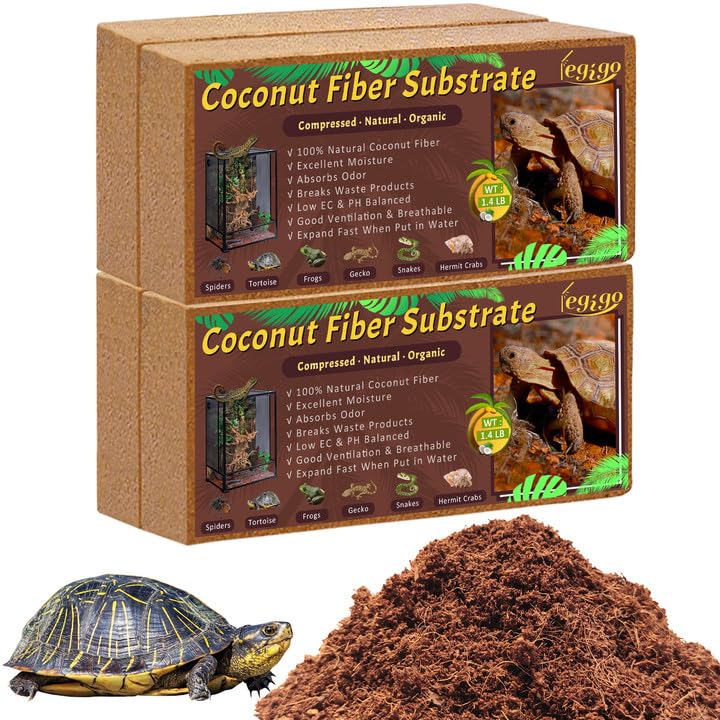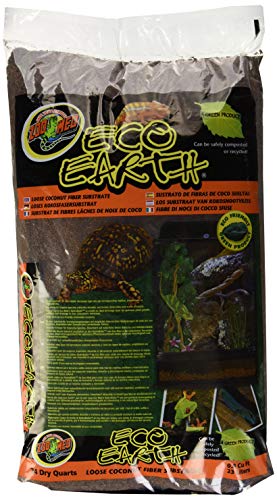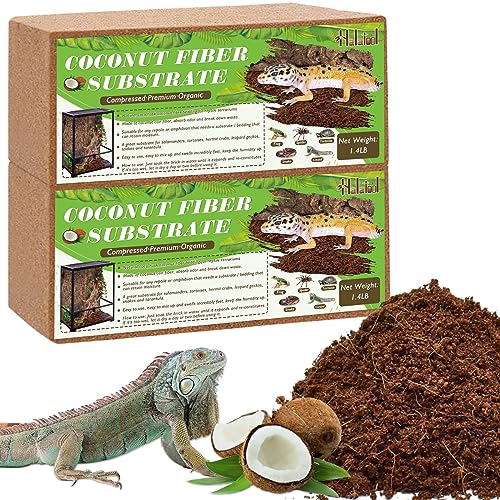Hey there! Are you a reptile enthusiast looking to create the perfect terrarium for your scaly friends? Well, look no further because I’ve got a treat for you! In this post, we’ll be diving into the world of coconut substrates for reptile terrariums. These natural and eco-friendly options not only provide a comfortable habitat for your reptiles but also offer a range of benefits. So, get ready to discover the top 7 coconut substrates that will make your reptiles feel right at home!
Legigo Coco Fiber Substrate – 4 Pack
The Legigo 4 Pack Compressed Coconut Fiber Substrate is a fantastic choice for reptile owners looking for high-quality bedding for their pets. Each brick expands to a generous size of 7.87 x 3.94 x 1.97 inches, providing ample coverage for your terrarium. Made from 100% natural coir fiber, this substrate is not only organic but also offers a clean and safe environment for your reptiles, amphibians, and other small pets. With its ability to hold moisture effectively, it ensures the comfort and well-being of your pets. Many users have praised its performance, noting that it holds water well and significantly improves their reptile’s activity levels. It is also highly versatile, making it suitable for a variety of reptiles, including snakes, hermit crabs, frogs, tortoises, and geckos. Additionally, the fine texture of the substrate eliminates the need to worry about large bark pieces, providing a consistent and visually appealing bedding option. Overall, the Legigo Compressed Coconut Fiber Substrate is a reliable and effective choice for reptile owners seeking a natural and organic substrate for their beloved pets.
ZeeDix Coco Coir Substrate for Reptiles
I absolutely love the ZeeDix 6Pcs Compressed Coconut Fiber Substrate! With each pack providing 7.8 x 3.9 x 1.97 inches of 100% organic coco coir fiber, this substrate creates a clean and comfortable environment for my pets to sleep, eat, and grow. Although it may require misting for steady humidity, my turtle enjoys digging and chilling on this substrate. Plus, it’s much safer for reptiles compared to bark or hay, making it an excellent choice for their terrarium bedding.
Zoo Med Eco Earth Coconut Fiber Substrate
The Zoo Med Eco Earth Loose Coconut Fiber Substrate is the perfect bedding for your reptiles, amphibians, and invertebrates. Made from recyclable coconut fiber, this substrate helps to maintain proper humidity levels in your terrarium, keeping your pets happy and healthy. It is also ideal for burrowing pets like tortoises and turtles, as it allows them to create natural burrows for resting and hibernation. Plus, it is eco-friendly and renewable, so you can compost or recycle the old or soiled substrate. Your pets will love this soft and natural bedding!
Riare Coconut Fiber Substrate for Reptiles
This 2 Pack Natural Coconut Fiber Substrate is a must-have for reptile owners. Made from natural coconut fiber, it’s odorless and retains humidity well, creating the perfect environment for your reptile pets. Not only does it enhance the temperature of the aquarium, but it also stimulates natural digging and burrowing behavior. Your reptiles, tortoises, frogs, snakes, hermit crabs, and other burrowing animals will love this premium compressed coconut husk bedding. It’s easy to use and provides a great substrate for your pets to dig and burrow in. Plus, it’s environmentally friendly, as it can be reused in planters or thrown in the organic waste bin after use.
Zilla Coconut Husk Bedding for Reptile Terrariums
Hey there reptile enthusiasts! Get ready to transform your terrarium into the ultimate rainforest oasis with Zilla Pet Reptile Terrarium Substrate Bedding. Made from 100% organic coconut fiber, this substrate is not only gentle and cozy for your scaly pals, but it also holds moisture perfectly, making it ideal for egg incubation. It’s like a luxurious rainforest spa retreat for your chameleons, geckos, frogs, and toads. Say goodbye to boring bedding and hello to the party pad of the century!
Halatool 2Pack Coco Coir Substrate
The Halatool 2Pack Organic Coco Coir Substrate is a natural and organic option for reptiles and amphibians. Made from coconut husk fiber, this substrate is clean and free of dirt or foreign substances. It is also reusable, making it an environmentally friendly choice. Although some reviewers mentioned that the blocks were slightly shorter than expected, overall the product was described as being just as described. One reviewer mentioned that the substrate was a bit dusty and lacked medium-sized bits for mound structure, but appreciated its visual aesthetic. However, they also mentioned that regular paper-based hamster bedding may be a better value.
REPTI ZOO Coco Husk Substrate
The REPTI ZOO Coconut Chip Substrate is a natural and compressed bedding option made from real coconut shells. It is designed for use by reptiles, amphibians, and invertebrates such as Ball Pythons, Snakes, Tortoises, Toads, and Lizards. This substrate provides a natural look and is mild to the skin and scales of your pets. It can even be used for variegated monstera plants! However, some customers have mentioned that the chips can be quite large compared to other products they have used before.
Choosing the Perfect Coconut Substrate for Your Reptile Terrarium
- Quality and Purity: Ensure that the coconut substrate you choose is of high quality and free from any harmful additives or chemicals. Look for products that are specifically designed for reptiles, as they are more likely to be safe and suitable for your scaly friend
- Absorbency and Moisture Control: Reptiles, especially those from tropical climates, require a specific level of humidity in their terrarium. Look for a coconut substrate that has excellent absorbency and moisture control properties. It should be able to hold moisture well, preventing excessive drying or sogginess. This will help to create a healthy and comfortable environment for your reptile
- Odor Control: Reptile terrariums can sometimes have a distinct smell due to waste and other factors. Opt for a coconut substrate that has good odor control properties. This will help to minimize any unwanted smells and keep the terrarium fresh for both you and your reptile
Unbeatable Value for a Natural and Sustainable Reptile Habitat
- Basic coconut substrate: $5-10 per bag. This is a budget-friendly option for reptile owners looking for a simple and affordable substrate
- Premium coconut substrate: $10-20 per bag. These substrates are of higher quality and often contain added nutrients or supplements to enhance reptile health
- Compressed coconut bricks: $15-25 per brick. These bricks need to be soaked in water to expand, providing a larger quantity of substrate compared to bagged options
- Organic coconut substrate: $20-30 per bag. These substrates are typically made from organic coconut husk fibers and are free of any chemicals or pesticides
- Specialty coconut substrates: $30-50 per bag. These substrates may have specific properties like increased moisture retention or odor control, catering to the needs of certain reptile species
- It’s important to note that prices may vary depending on the brand, quantity, and location of purchase. I recommend checking with local pet stores or online retailers for the most accurate and up-to-date pricing information
Top Reptile Substrate Brands
Getting started with your Reptile Terrarium coconut Substrate
- Choose the right amount: Determine the size of your reptile’s terrarium and calculate the amount of substrate needed. It’s recommended to have at least 2-3 inches of substrate for burrowing reptiles and 1 inch for non-burrowing ones
- Prepare the substrate: Before placing it in the terrarium, moisten the coconut substrate with clean water. Start by adding a small amount of water and gradually mix it until the substrate feels slightly damp but not soaking wet. This will help create a suitable humidity level for your reptile
- Spread and shape the substrate: Once the substrate is properly moistened, evenly spread it on the terrarium floor. You can shape it to create different landscape features like hills or hiding spots. Be sure to avoid any sharp edges that might harm your reptile
- Remember to regularly monitor the humidity levels and cleanliness of the substrate to ensure a healthy environment for your reptile. Happy terrarium keeping!
Get answers to all your questions about using coconut substrate in your reptile terrarium!
Are there any specific reptile species that prefer coconut substrate over others?
Yes, there are certain reptile species that prefer coconut substrate over others. One example is the Green Iguana (Iguana iguana). These reptiles are native to the tropical regions of Central and South America, where they inhabit trees and feed on vegetation. In captivity, many Green Iguana owners find that coconut substrate, such as coconut coir or fiber, closely mimics their natural habitat and provides a suitable substrate for them to burrow and lay eggs. However, it is important to note that preferences can vary among individual reptiles, so it’s always advisable to research the specific needs of the reptile species you are interested in keeping.
How long does coconut substrate typically last before needing replacement?
In my experience, coconut substrate typically lasts for around 12-18 months before needing replacement. However, this can vary depending on various factors such as the type of plants being grown, watering frequency, and overall maintenance. Regularly monitoring the substrate’s condition and the health of your plants will help you determine when it’s time for a replacement.
Can coconut substrate be used for reptile eggs incubation?
Yes, coconut substrate can be used for reptile egg incubation. Coconut coir, which is the fibrous material derived from coconut husks, is a popular choice for creating a suitable environment for incubating reptile eggs. It has good moisture retention properties and provides a stable and breathable substrate for the eggs. Many reptile keepers use coconut substrate successfully for incubating various reptile species, including snakes, lizards, and turtles. It is important to ensure that the substrate is properly moistened to maintain the ideal humidity levels for the specific species of reptile eggs being incubated.
Hello! I’m Ava Wilson, the passionate founder of Pet Pantry Place, your go-to destination for all things pet-related. My mission is to create a platform where fellow pet enthusiasts can discover the finest supplies and gain valuable insights to ensure a joyful and fulfilling life for their pets.










